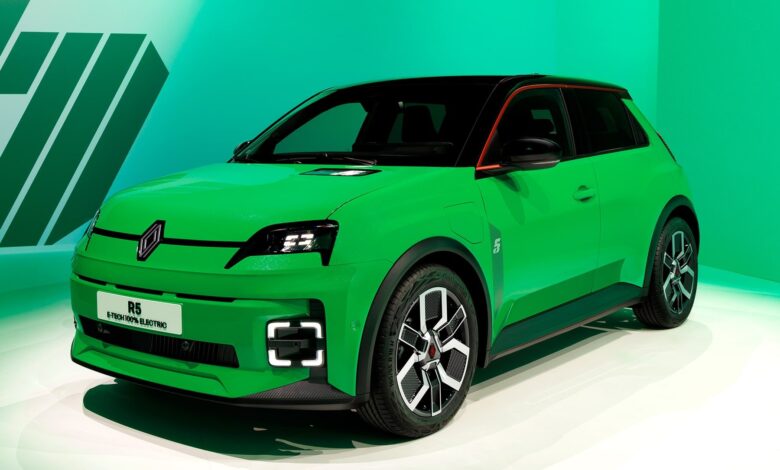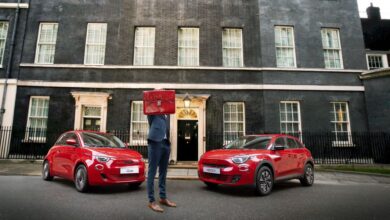Electric Renault 5 starts at 32,900 euros

Since its presentation in February, all the data on the Renault 5 E-Tech Electric has been known – except for the price, which the French carmaker has now revealed. The compact electric model is based on design elements of the historic R5 and will shake up the small electric car segment from autumn 2024. Initially, two of five trim levels will go on sale – starting from €32,900 or €279 per month. Both versions – the Techno and the Iconic Five – have the larger 52-kWh battery. The basic version with the smaller 40-kWh battery will follow next year. According to Renault, it will sell from 24.900 euros, making it the ‘25,000-euro electric car’ the French company had promised in advance. The other two equipment levels will also follow in 2025, completing the quintet of Five, Evolution, Techno, Iconic Five and Roland-Garros (the latter is a special model).
Since February, we have known that the electric R5 is not a vintage car like the Honda e. Although the small five-seater offers references to its predecessor from the 70s and 80s, it translates these almost without exception into the present day. The Renault 5 E-Tech Electric measures 3.92 x 1.77 x 1.5 metres with a wheelbase of 2.54 metres. In addition to two battery sizes, customers can choose between three different drive systems. At market launch, the aforementioned 52 kWh battery (net) will only be available in combination with the most powerful version – 110 kW. It will be followed next year not only by variants with a 40 kWh battery, but also with 90 and 70 kW electric motors. Both batteries contain prismatic NMC cells from Renault’s battery partner AESC. According to Renault, the vehicles and the batteries (from 2025) will be manufactured in northern France.
The French company specifies a WTLP range of 410 or 300 kilometres, depending on the battery size. The manufacturer puts the top speed at 150 kph and acceleration from 0 to 100 kph in less than eight seconds. All electric R5s have an 11 kW AC onboard charger as standard. DC charging is possible with up to 100 kW. The time window for fast charging is around 30 minutes from 15 to 80 per cent charge level (SoC). At AC stations, the charging process will be 4.5 or 3.5 hours, depending on the battery size.
What is disappointing is that Renault will initially launch the electric R5 on the German market without the promised V2G capability. The two higher motorisations should each have a bidirectional AC charger on board and – as announced by Renault in mid-2023 – be the company’s first vehicles capable of vehicle-to-grid (V2G), i.e. feeding electricity back into the grid. While the feature will be introduced in France and Spain, for example, the vehicles in Germany are only capable of the already quite widespread V2L – i.e. charging external devices with 3.7 kW here.
Renault does not explain why the V2G function will not initially be offered in Germany. As is known, it is being implemented in Europe with technology partner The Mobility House. The vast number of grid operators likely causes the delay. After all, there are more than 900 electricity grid operators in Germany. In other countries, the number of grid operators is in the single digits.
Before the official launch on 31 May, Renault is giving holders of the so-called R5 R-Pass a ten-day slot for their order from today. This pass was available in advance for 150 euros. Customers can choose from five colours: eye-catching green and yellow or the more subdued colours midnight blue, white, and black pearl. The green paintwork is available ex works, the other colours at an extra charge.
The now-available Techno and Iconic Five versions differ primarily in terms of the interior trim and seats. As standard, they offer automatic air conditioning, 18-inch wheels (‘Techno’ and ‘Chrono’), a reversing camera, adaptive cruise control and two horizontal displays: a 10-inch digital driver’s display and a 10.1-inch central monitor for the OpenR Link multimedia system with integrated Google. The latter includes a route planner specially designed for electric vehicles.
Incidentally, the electric R5 launches on the home market in France at a slightly higher starting price. However, as it qualifies for the full purchase subsidy there, it ultimately costs less than in Germany, namely 29,490 euros.
presse.renault.com (in French)



